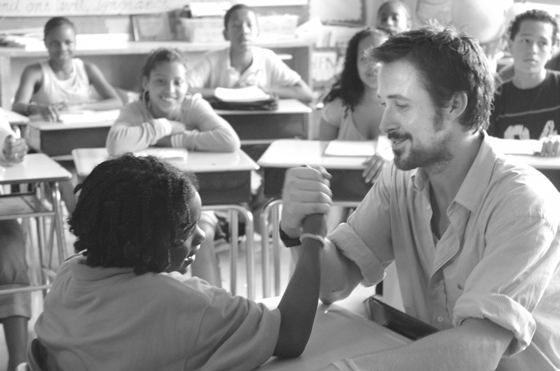By Leonard Quart
The powerfully and subtly performed and scripted “Half Nelson”—a low budget, realistically shot, independent film—is a striking debut from director and screenwriter Ryan Fleck and his co-writer Anna Boden. Set in a derelict Brooklyn of abandoned lots, ominous night streets, and claustrophobic apartments, the film centers on the relationship between a drug-addicted, politically left-leaning, over-30 junior high school history teacher, Dan Dunne (the gifted Ryan Gosling) and a clear-eyed, independent, basically innocent African-American 13-year-old student, Drey (Shareeka Epps).
The dark glasses wearing, chain-smoking, haunted-looking Dan teaches history to a class of African–Americans and Hispanics. He’s a passionate and hip teacher, who instructs the students (delivering ‘the truth’ rather than using the Socratic method) on the civil rights movement, Attica, and America’s role in the destruction of Salvatore Allende. “Half Nelson,” however, avoids the facile optimism of so many Hollywood inspirational films about teachers who save their students from the perniciousness of the streets like “Stand and Deliver” and “Lean On Me.” Dan’s pupils don’t suddenly become infused with political idealism, but his teaching makes some more conscious of politics and history, while the others remain asleep or incapable of hearing anything. And for all Dan’s passion, one senses that the students don’t exist for him as individuals until he gets to know Drey.
Drey discovers Dan lying on the school bathroom floor with a crack pipe in his hand. She doesn’t turn him in to the school authorities, but this tough, knowing girl gradually builds a relationship with him. And Dan, in turn, a man who is seemingly without friends; who is emotionally removed from his alcoholic, disenchanted 60s activist parents; and whose relationships with women are purely sexual, establishes an awkward, paternal intimacy with her. It’s clear that the solitary Drey is someone who needs a father.
The other significant character in the film is a slick, smart midlevel drug dealer, Frank (Anthony Mackie). In his insidious way, Frank truly cares for Drey. And though corrupt, he’s in control of his life, so he’s disturbed by the anarchic Dan’s influence over Drey. But the film avoids the predictable, and eschews violent confrontations between them.
The film’s three central characters are intricately rendered, all touched with contradictions. Dan is the most layered of them—opposed to the powers that be, but too self-destructive and despondent to do more than indulge in rebellious gestures. And though usually sensitive to Drey’s feelings, he’s callous in his relations with the women he spends the night with.
Dan is also a crack addict, but this isn’t a film about the nature of addiction. And though “Half Nelson” does not hide its left sympathies, the dreams of the 60s are over, and there is only disillusionment in its wake. The only hope the film leaves, is the capacity of a broken man like Dan’s capacity to create a bond with Drey. There are no utopias in the offing — just a small film with a great deal of emotional and intellectual resonance.


































